北师大版选修7unit20课时活页训练
- 格式:pdf
- 大小:420.26 KB
- 文档页数:7
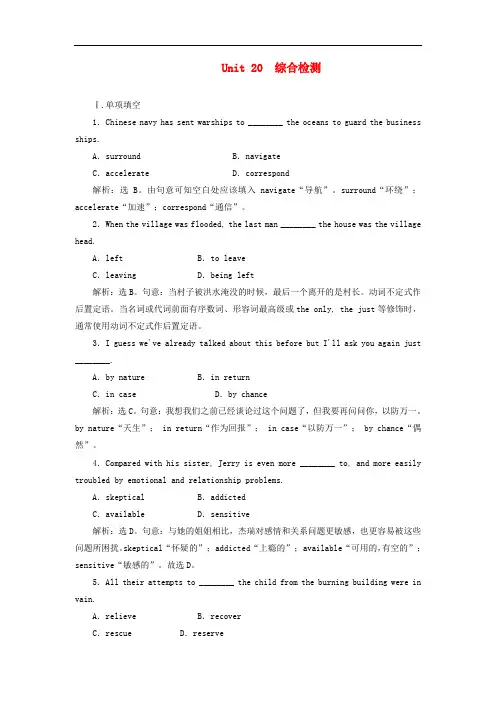
Unit 20 综合检测Ⅰ.单项填空1.Chinese navy has sent warships to ________ the oceans to guard the business ships.A.surround B.navigateC.accelerate D.correspond解析:选B。
由句意可知空白处应该填入navigate“导航”。
surround“环绕”;accelerate“加速”;correspond“通信”。
2.When the village was flooded, the last man ________ the house was the village head.A.left B.to leaveC.leaving D.being left解析:选B。
句意:当村子被洪水淹没的时候,最后一个离开的是村长。
动词不定式作后置定语。
当名词或代词前面有序数词、形容词最高级或the only, the just等修饰时,通常使用动词不定式作后置定语。
3.I guess we've already talked about this before but I'll ask you again just ________.A.by nature B.in returnC.in case D.by chance解析:选C。
句意:我想我们之前已经谈论过这个问题了,但我要再问问你,以防万一。
by nature“天生”;in return“作为回报”;in case“以防万一”;by chance“偶然”。
4.Compared with his sister, Jerry is even more ________ to, and more easily troubled by emotional and relationship problems.A.skeptical B.addictedC.available D.sensitive解析:选D。
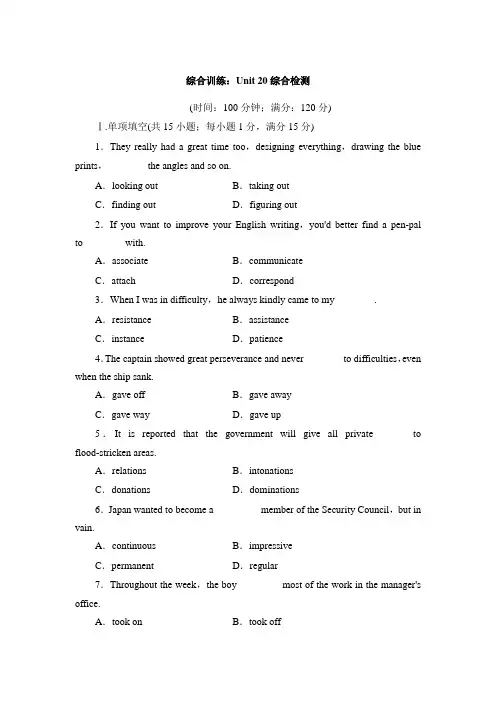
综合训练:Unit 20综合检测(时间:100分钟;满分:120分)Ⅰ.单项填空(共15小题;每小题1分,满分15分)1.They really had a great time too,designing everything,drawing the blue prints,________the angles and so on.A.looking out B.taking outC.finding out D.figuring out2.If you want to improve your English writing,you'd better find a pen-pal to________ with.A.associate B.communicateC.attach D.correspond3.When I was in difficulty,he always kindly came to my________.A.resistance B.assistanceC.instance D.patience4.The captain showed great perseverance and never________to difficulties,even when the ship sank.A.gave off B.gave awayC.gave way D.gave up5.It is reported that the government will give all private________to flood-stricken areas.A.relations B.intonationsC.donations D.dominations6.Japan wanted to become a _________member of the Security Council,but in vain.A.continuous B.impressiveC.permanent D.regular7.Throughout the week,the boy ________ most of the work in the manager's office.A.took on B.took offC.took in D.took over8.This project requires close teamwork.________ will be achieved unless we work well together.A.Nothing B.AnythingC.Something D.Everything9.He is a man of ________ideas and he often makes a careful plan________.A.advanced;before advanceB.advanced;in advance ofC.advanced;in advanceD.advancing;in advance of10.The judges had different ideas about the results,so it was two hours before the final results were________.A.carried out B.let outC.announced D.declared11.-Did you finish the film that night?-Yes.The ________part of the film that you missed pushed the play to climax(高潮).A.later B.latterC.late D.latest12.-Has the doctor ________her illness?-No,he________ her but didn't ________her.A.cured;treated;treatB.cured;cured;treatC.treated the old woman for;treated;cureD.cured the old woman of;treated;cure13.I can't ________what has happened to the vegetables,for they were freshly picked this morning.A.look out B.take outC.work out D.figure out14.When you arrive,I ________in reception for you.。
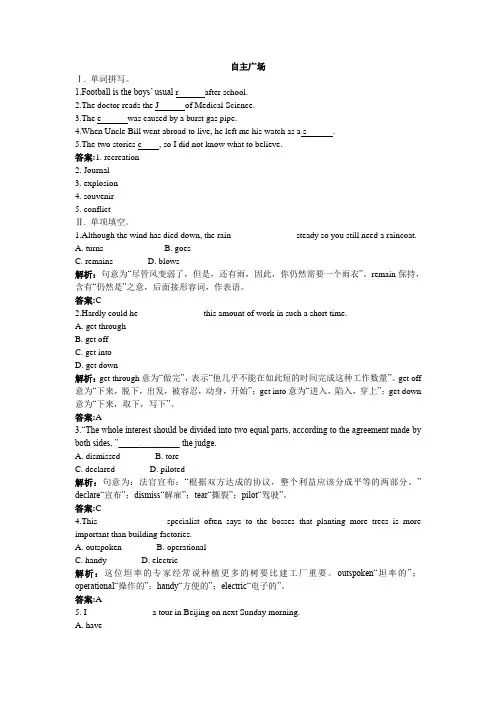
自主广场Ⅰ. 单词拼写。
1.Football is the boys’ usual r after school.2.The doctor reads the J of Medical Science.3.The e was caused by a burst gas pipe.4.When Uncle Bill went abroad to live, he left me his watch as a s.5.The two stories c, so I did not know what to believe.答案:1. recreation2. Journal3. explosion4. souvenir5. conflictⅡ. 单项填空。
1.Although the wind has died down, the rain ______________ steady so you still need a raincoat.A. turnsB. goesC. remainsD. blows解析:句意为“尽管风变弱了,但是,还有雨,因此,你仍然需要一个雨衣”。
remain保持,含有“仍然是”之意,后面接形容词,作表语。
答案:C2.Hardly could he ______________ this amount of work in such a short time.A. get throughB. get offC. get intoD. get down解析:get through意为“做完”,表示“他几乎不能在如此短的时间完成这种工作数量”。
get off 意为“下来,脱下,出发,被容忍,动身,开始”;get into意为“进入,陷入,穿上”;get down 意为“下来,取下,写下”。
答案:A3.“The whole interest should be divided into two equal parts, according to the agreement made by both sides, ”______________ the judge.A. dismissedB. toreC. declaredD. piloted解析:句意为:法官宣布:“根据双方达成的协议,整个利益应该分成平等的两部分。
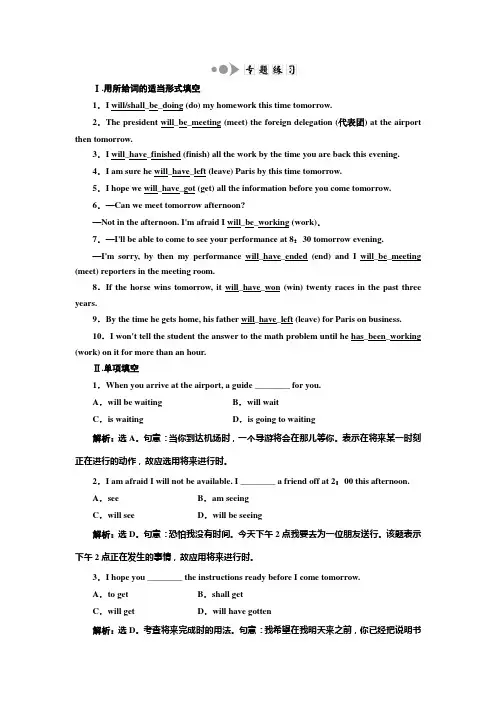
Ⅰ.用所给词的适当形式填空1.I will/shall_be_doing (do) my homework this time tomorrow.2.The president will_be_meeting (meet) the foreign delegation (代表团) at the airport then tomorrow.3.I will_have_finished (finish) all the work by the time you are back this evening.4.I am sure he will_have_left (leave) Paris by this time tomorrow.5.I hope we will_have_got (get) all the information before you come tomorrow.6.—Can we meet tomorrow afternoon?—Not in the afternoon. I'm afraid I will_be_working (work).7.—I'll be able to come to see your performance at 8:30 tomorrow evening.—I'm sorry, by then my performance will_have_ended (end) and I will_be_meeting (meet) reporters in the meeting room.8.If the horse wins tomorrow, it will_have_won (win) twenty races in the past three years.9.By the time he gets home, his father will_have_left (leave) for Paris on business.10.I won't tell the student the answer to the math problem until he has_been_working (work) on it for more than an hour.Ⅱ.单项填空1.When you arrive at the airport, a guide ________ for you.A.will be waiting B.will waitC.is waiting D.is going to waiting解析:选A。
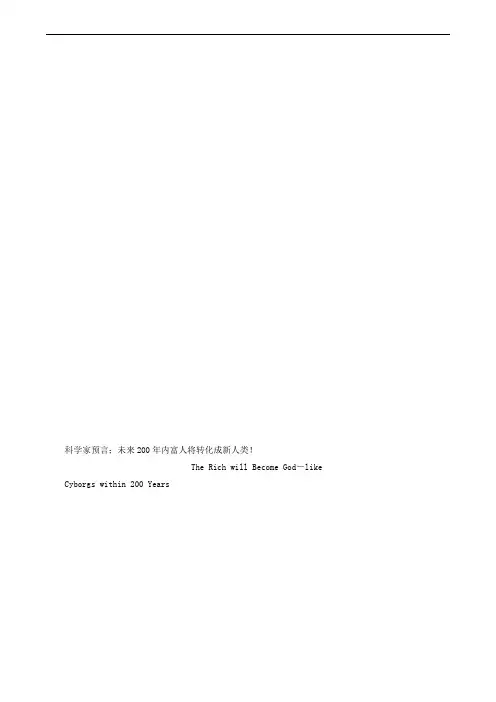
科学家预言;未来200年内富人将转化成新人类!The Rich will Become God-like Cyborgs within 200 YearsThe rich are set to become God-like cyborgs in what could be the ①________ (big) evolution2 in biology after life emerged.This is according to Yuval Noah Harari,a professor at the Hebrew University of Jerusalem,who believes the extreme shift will take place in the next 200 years.②________ (use) biotechnology and genetic engineering,Professor Harari claims the wealthy will transform into a new type of divine3,immortal4 human with complete power over life and death.He argues that humans are unable to resist the temptation to “upgrade” themselves,according to a report by Sarah Knapton in the Telegraph.“We ③________ (programme) to be dissatisfied,” said Professor Harari,during a recent speech at the Hay literary festival in Wales.“Even when humans ga in pleasure and achievements it is not enough.They want more and more.”I think it is likely in the next 200 years or so human beings will upgrade themselves into some idea of a divine being,either through biological manipulation5 or genetic engineering or by the creation of cyborgs,part organic,part non-organic.“It will be the greatest evolution in biology after the appearance of life.Nothing ④________ (real) has changed in four billion years biologically speaking.”“But we will be as different from today's humans as chimps are now from us.”The technology to do this,however,will be restricted to the very wealthy,claims Professor Harari.Up until now,he says society has been held together by inventing “fictions”,such as religion,money and the idea of fundamental human rights.As long as humans believed they relied more and more on these gods they were controllable,he said.“But what we see in the last few ⑤________ (century) is that humans are becoming more powerful and they no longer need the crutches6of the Gods.”“Now we are saying we do not need God just technology,” he added.Notes1.cyborg n.半机械人,电子人2.evolution n.进化3.divine adj.神圣的4.immortal adj.神的,不朽的5.manipulation n.操纵,控制6.crutch n.拐杖,支撑TaskFill in the blanks with the proper forms of the given words.答案①biggest②Using③are programmed④really⑤centuries。
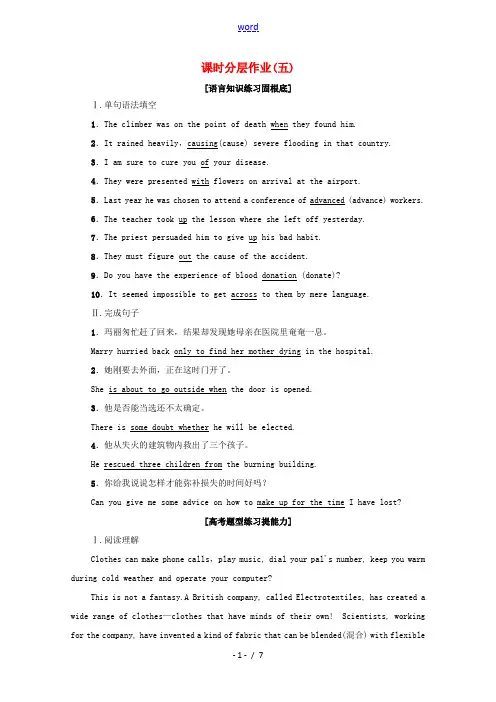
课时分层作业(五)[语言知识练习固根底]Ⅰ.单句语法填空1.The climber was on the point of death when they found him.2.It rained heavily,causing(cause) severe flooding in that country.3.I am sure to cure you of your disease.4.They were presented with flowers on arrival at the airport.5.Last year he was chosen to attend a conference of advanced (advance) workers.6.The teacher took up the lesson where she left off yesterday.7.The priest persuaded him to give up his bad habit.8.They must figure out the cause of the accident.9.Do you have the experience of blood donation (donate)?10.It seemed impossible to get across to them by mere language.Ⅱ.完成句子1.玛丽匆忙赶了回来,结果却发现她母亲在医院里奄奄一息。
Marry hurried back only to find her mother dying in the hospital.2.她刚要去外面,正在这时门开了。
She is about to go outside when the door is opened.3.他是否能当选还不太确定。
There is some doubt whether he will be elected.4.他从失火的建筑物内救出了三个孩子。
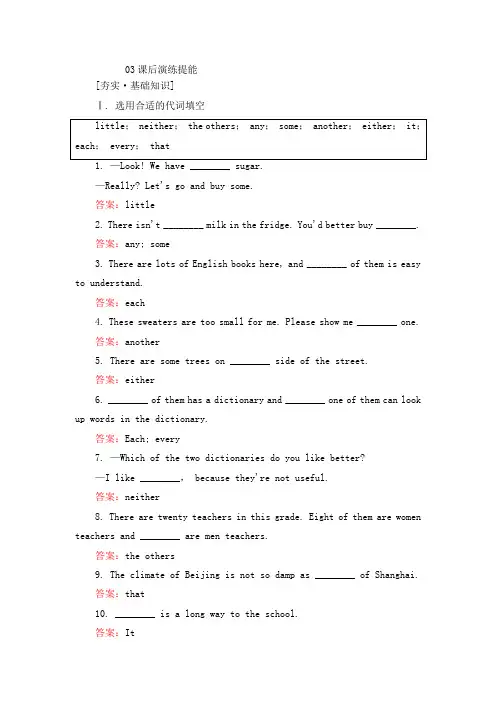
03课后演练提能[夯实·基础知识]Ⅰ. 选用合适的代词填空—Really? Let's go and buy some.答案:little2. There isn't ________ milk in the fridge. You'd better buy ________.答案:any; some3. There are lots of English books here, and ________ of them is easy to understand.答案:each4. These sweaters are too small for me. Please show me ________ one.答案:another5. There are some trees on ________ side of the street.答案:either6. ________ of them has a dictionary and ________ one of them can look up words in the dictionary.答案:Each; every7. —Which of the two dictionaries do you like better?—I like ________, because they're not useful.答案:neither8. There are twenty teachers in this grade. Eight of them are women teachers and ________ are men teachers.答案:the others9. The climate of Beijing is not so damp as ________ of Shanghai.答案:that10. ________ is a long way to the school.答案:ItⅡ. 用所给词的适当形式填空1. When you arrive, I __________________ (wait) for you in reception.答案:will be waiting2. I __________________ (listen) to the music at this time tomorrow evening.答案:will be listening3. —Would you like to go to the cinema tomorrow?—Sure. By then, I __________________ (finish) my exam.答案:shall/will have finished4. He __________________ (work) in the factory for five years before he moved here.答案:had worked5. The mayor of the city says that all construction work for the Olympics __________________ (complete) by 2015.答案:will have been completedⅢ. 完成句子1. I hope you ____________________________ before you go abroad next month.我希望你下个月出国前学会所有的法语单词。
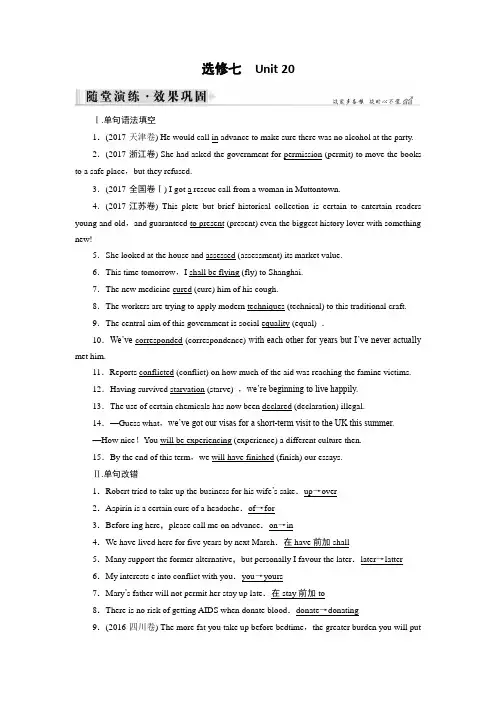
选修七Unit 20Ⅰ.单句语法填空1.(2017·天津卷) He would call in advance to make sure there was no alcohol at the party.2.(2017·浙江卷) She had asked the government for permission (permit) to move the books to a safe place,but they refused.3.(2017·全国卷Ⅰ) I got a rescue call from a woman in Muttontown.4.(2017·江苏卷) This plete but brief historical collection is certain to entertain readers young and old,and guaranteed to present (present) even the biggest history lover with something new!5.She looked at the house and assessed (assessment) its market value.6.This time tomorrow,I shall be flying (fly) to Shanghai.7.The new medicine cured (cure) him of his cough.8.The workers are trying to apply modern techniques (technical) to this traditional craft.9.The central aim of this government is social equality (equal) .10.We’ve corresponded (correspondence) with each other for years but I’ve never actually met him.11.Reports conflicted (conflict) on how much of the aid was reaching the famine victims.12.Having survived starvation (starve) ,we’re beginning to live happily.13.The use of certain chemicals has now been declared (declaration) illegal.14.—Guess what,we’ve got our visas for a shortterm visit to the UK this summer.—How nice!You will be experiencing (experience) a different culture then.15.By the end of this term,we will have finished (finish) our essays.Ⅱ.单句改错1.Robert tried to take up the business for his wife’s sake.up→over2.Aspirin is a certain cure of a headache.of→for3.Before ing here,please call me on advance.on→in4.We have lived here for five years by next March.在have前加shall5.Many support the former alternative,but personally I favour the later.later→latter6.My interests e into conflict with you.you→yours7.Mary’s father will not permit her stay up late.在stay前加to8.There is no risk of getting AIDS when donate blood.donate→donating9.(2016·四川卷) The more fat you take up before bedtime,the greater burden you will puton your body at night.up→in10.The brave firefighter rescued three children of the burning building yesterday. of→from Ⅲ.课文与短文改错根据课文内容,对下面材料进行修改。
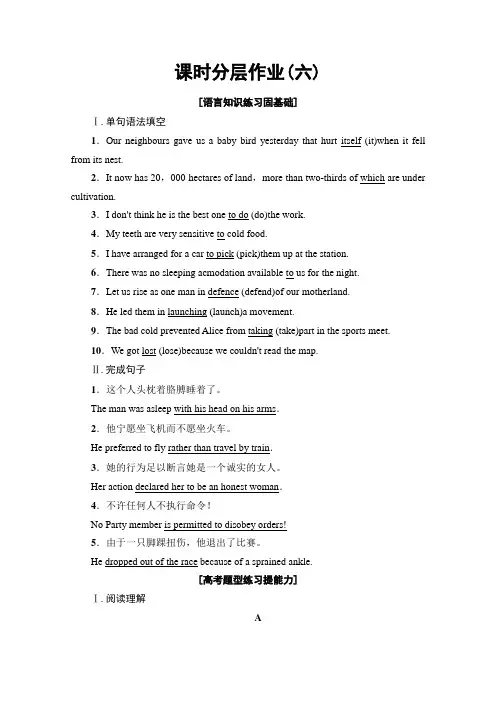
课时分层作业(六)[语言知识练习固基础]Ⅰ.单句语法填空1.Our neighbours gave us a baby bird yesterday that hurt itself (it)when it fell from its nest.2.It now has 20,000 hectares of land,more than two-thirds of which are under cultivation.3.I don't think he is the best one to do (do)the work.4.My teeth are very sensitive to cold food.5.I have arranged for a car to pick (pick)them up at the station.6.There was no sleeping acmodation available to us for the night.7.Let us rise as one man in defence (defend)of our motherland.8.He led them in launching (launch)a movement.9.The bad cold prevented Alice from taking (take)part in the sports meet.10.We got lost (lose)because we couldn't read the map.Ⅱ.完成句子1.这个人头枕着胳膊睡着了。
The man was asleep with his head on his arms.2.他宁愿坐飞机而不愿坐火车。
He preferred to fly rather than travel by train.3.她的行为足以断言她是一个诚实的女人。
Ⅰ.单项填空1.Little ________ about his own safety, though he was in great dangerhimself.A.does he care B.did he careC.he cares D.he cared解析:选B。本题考查倒装的用法。当否定词(little)置于句首时,该句应用部分倒装,C、D不对;由was可知应用过去时,故选B。2.Chinese being looked down upon in Indonesia ________to theattention of the Chinese ambassador.A.has been brought B.has broughtC.has been paid D.has paid解析:选A。bring sth.to the attention of sb.表示“使某人关注某事”。3.One of the reasons the oil prices are rising is the developed countriesare________more oil.A.accomplishing B.acceptingC.accounting D.accumulating解析:选D。accumulate表示“积累,积聚”。句意:油价上涨的原因之一是发达国家在积聚更多的石油。4.He was drunk and had to be________home.A.brought up B.raisedC.supported D.made解析:选C。support支撑,扶持;bring up 养大,教育;raise举起,抚养;make 生产,制造。5.She________the medicine with the help of some water.A.absorbed B.swallowedC.choked D.allowed解析:选B。swallow 吞下,咽下;absorb 吸收;choke 哽住;allow允许。6.At the foot of the mountain________.A.a village lie B.lies a villageC.does a village lie D.lying a village解析:选B。英语中介词短语或副词做状语位于句首且主语是名词时,应用完全倒装。7.—Why can’t I smoke here?—At no time________in the meeting.A.is smoking permitted B.smoking is permittedC.does smoking permit D.smoking does permit解析:选A。at no time位于句首,句子用部分倒装。8.________are the days when we used foreign oil.A.To go B.GoingC.Gone D.Go解析:选C。这是一个全部倒装结构。正确句序是The days when weused foreign oil are gone.9.With some books badly needed________,she hurried to thebookstore.A.buying B.boughtC.to buy D.buy解析:选C。本句有with 的独立主格结构,with+n.+to do,有……要去做。句意:有一些急需的书要去买,她匆忙地跑到书店。10.It was________then________he________to know that she wasBritish.A.until;did ;come B.not until;did;comeC.not until;that;came D.until;that; came解析:选C。此处为not...until...句型的强调句。11.The hotel guests tried their best to________the burning building.A.avoid B.fleeC.escape D.escape from解析:选D。本题考查escape的用法。A项不合句意,flee和escape作“逃脱,逃走”讲时,皆为不及物动词,故应选D,escape from...从……逃跑。12.All things________ into consideration, the planned trip will have tobe called off.A.taken B.takingC.to take D.being taken解析:选A。本题考查过去分词作状语。这里过去分词作状语表示条件和被动。句意:如果把所有的事情都考虑在内,原计划的旅行将不得不被取消。故选A。13.Mr.Smith used to smoke________but he has given it up.A.seriously B.heavilyC.badly D.hardly解析:选B。本题考查副词辨析。seriously严肃地,认真地,严重地;heavily重地,沉闷地,(吸烟、喝酒等)猛烈地,大量地;badly糟糕,差劲地;hardly几乎不。14.In the face of all these difficulties,we’re not discouraged and ourspirits________well.A.pick up B.go upC.hold up D.keep up解析:选D。考查动词短语的使用。从语境看,这里用keep up表示“保持,维持”,句意:面对所有这些困难时,我们没有泄气,我们的精神状态仍然很好。15.________,Carolina couldn’t get the door open.A.Might she as try B.As she might tryC.She might as try D.Try as she might解析:选D。本题考查倒装的用法。由四个选项及句意看,as在该句中引导让步状语从句,这时应该用倒装语序,故应选D。Ⅱ.阅读理解AScientists found that sleeping considerably improves our creativity. Aftertaking a nap people are able to think faster and put more imagination intotheir thinking. Besides, if we dream, the thinking abilities are improved evenmore.Researchers consider that sleeping on a problem in most cases leads toelucidation(解释).They say when a person enters a phase called Rapid EyeMovement(REM)during sleep, it increases the effect. Such phase takes placeright before we awake and according to scientists it helps our brain makelinks between unrelated subjects.In the study, led by Professor Sara Mednick, scientists made aconclusion that the REM was“important for assimilating(消化)newinformation into past experience”in order to find creative solutions to solveproblems.Prof.Mednick is a psychiatrist at the University of California. Her studyinvolved the analysis of 77 adults. Each participant was given severalwordassociated creative tasks. All tasks were given in the morning,withparticipants being shown a number of groups of 3 words, for example:cookie,heart and sixteen. They were asked to come up with a word thatwould be associated all three given terms—like sweet. Sometime later, aftersome participants were allowed to sleep, they were asked to perform the sametasks and some new ones. It is worth mentioning that while some peopleslept, researchers used brain scans to see the type of sleep each participantentered.When given the same tasks, participants, who took a nap, were able togive more varied solutions, some of which were much better than they gaveearlier. But when given new tasks, researchers found that those who enteredREM sleep had a 40 percent better result compared to the performance theyshowed in the morning, reported The Daily Telegraph.1.What does “it” refer to in the second paragraph?A.The effect. B.REM.C.Sleep. D.A problem.解析:选B。词义猜测题。根据本文第二段内容可知,睡眠在很多情况下可以帮助解决问题,当一个人进入REM睡眠阶段时,这种效果就更强了。这个阶段在我们醒之前发生,它帮助大脑把不相关的事情联系起来。因此“it”指的是REM睡眠阶段,故选B。2.Why do the researchers study the REM?A.Because REM takes place just after you sleep.B.Because REM can store more information.C.Because REM can help find creative solutions.D.Because REM can make a creative invention.解析:选C。细节理解题。由第三段可知,科学家是为了找到有创造性的解决问题的办法才研究REM的,故选C。3.What can we know from this passage?A.Taking a short nap is good for your thinking during the day.B.Sleeping has three processes which is good for creativity.C.Each adult was allowed to sleep after the task was given.D.REM is a process taking place right after we awake when we nap.解析:选A。推理判断题。本文主要论述了睡眠可以提高人的创造力,而且小睡一会儿对思维和想象力都有好处,故选A。4.The important stage in the study is________.A.to think of a creative wordB.to show a group of 3 wordsC.to give participants time to thinkD.to let some participants sleep for a while